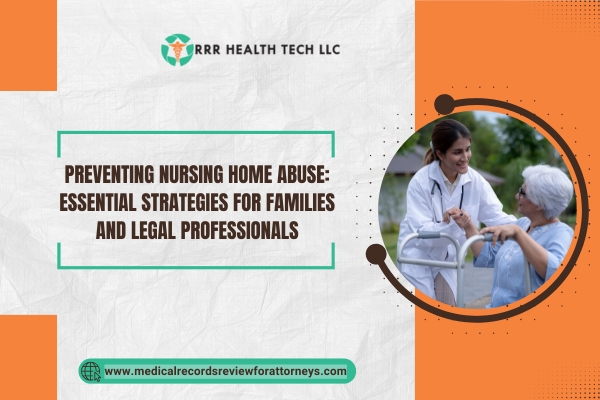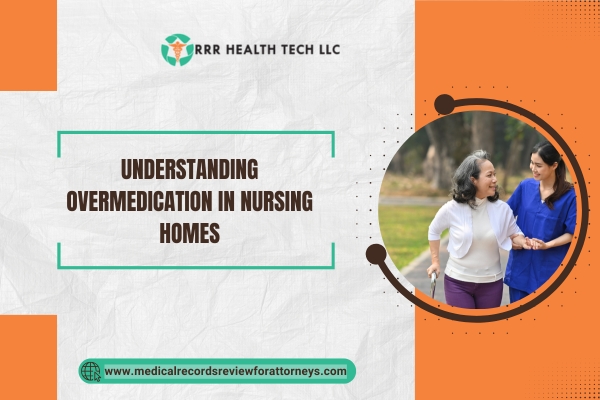
Introduction
Senior care offered in clinics around the US tends to be subpar and that substandard care becomes the reason for nursing home abuse. As families try their best to ensure that their elderly loved ones are taken care of, the more realistic task would be to understand what steps one needs to take in order to prevent such abuse from happening. This article focuses on the different types of nursing home abuse, some strategies that can be taken to prevent it, and the important aspect of maintaining medical records, helping protect residents’ legal rights.
Understanding Nursing Home Abuse
What is Nursing Home Abuse?
Nursing home abuse refers to any intentional or negligent act by a caregiver that causes harm or distress to a resident. This can manifest in various forms, including:
- Physical Abuse: Striking, punching, kicking, pulling on any restraint and harming patients physically.
- Emotional Abuse: Harassment in any verbal form, threats, and humiliation target the psychological health of people.
- Neglect: One of the most common forms of abuse where patients are ignored and are left to tend for themselves or without proper care leading to risk to their health and wellbeing.
- Financial Exploitation: Any form of fraudulent or illegal usage of a nursing home veteran’s money or property will fall under this.
Statistics on Nursing Home Abuse
- According to the National Center on Elder Abuse, approximately 1 in 10 older adults experience some form of elder abuse, with nursing home residents being particularly vulnerable.
- A study published in the Journal of the American Geriatrics Society, 44% of residents of nursing homes reported being abused or neglected.
Identifying Signs of Nursing Home Abuse
Common Warning Signs
Families should be vigilant for signs of abuse, which may include:
• Bruises in some parts of the body caused by unknown reasons
• Uncharacteristic change in behavior or mood
• A tendency to isolate from people
• High levels of messiness in the body and living areas
• Discrepancies in finances or missing valuables
Importance of Regular Visits
Regular visits to nursing homes can help families monitor their loved ones’ well-being and identify any potential issues early on. Engaging in open conversations with residents can also encourage them to share their experiences.
Effective Strategies to Prevent Nursing Home Abuse
1. Research and Choose the Right Facility
- After doing a comprehensive background check into a facility’s history of complaints and allegations, the family can then select a nursing home.
- Ensure that you seek out as many facilities as possible in order to compare the conditions and quality of care in each one of these centers.
2. Establish Open Communication
- Scheduled Monitoring: Families are recommended to have frequent communication with their loved ones and the staff members who take care of them.
- Residents should not be silent: Giving the residents the right to raise their voices can lead to reduced chances of residents experiencing abuse and neglect.
3. Advocate for Resident Rights
- Be aware of the rights of the residents in your care: Make yourself familiar with the rights and freedoms of nursing home residents which include the right to respect, and proper treatment.
- Raise the alarm immediately: In the event that there is the suspicion of abuse or neglect, it is best for the families to raise any concerns or any suspicions to the authorities without any delay.
4. Utilize Medical Record Review Services
- Importance of Medical Records: Medical records provide essential documentation of a resident’s health and care history, which can be crucial in identifying patterns of neglect or abuse.
- Medical Record Review Services: These reports assist your attorney in retrieving and interpreting medical records so that all documents relevant to the possible case are ready in advance.
Legal Recourse for Nursing Home Abuse Victims
Understanding Legal Options
Victims of nursing home abuse and their families may have several legal options, including:
- Reporting: The families can also make complaints with the state agencies that are responsible for licensing and control of the nursing homes.
- Commencing a Civil Suit: In the events of neglect or abuse occurring, the family may file a civil suit against the responsible parties or the nursing home.
The Role of Attorneys
Attorneys specializing in elder law can provide invaluable assistance in navigating the legal process, ensuring that victims receive the compensation they deserve for their suffering.
Case Studies
Case Study 1: Physical Abuse in a Nursing Home
Overview: A family found out that their frail mother was forcefully restrained by one of the staff at a nursing home center.
Challenges: The employees of the nursing center counterclaimed, and hence, the family faced difficulty in collecting the odds required.
Solutions: As a medicolegal company, the family hired a medical record review contractor to investigate maternal injuries such as any history of the abuse inflicted upon her. Additionally, they obtained testimony from other residents and attending staff.
Case Study 2: Neglect Leading to Health Deterioration
Overview: The elderly gentleman had been living in a nursing home was neglected cordial attention resulting in deteriorating health with severe bedsores.
Challenges: The family had a hard time validating their statement that the nursing unit had treated their father inappropriately.
Solutions: With the help of medical record review services, the family acquired a comprehensive account of the medical status of the man in chronological order which clearly depicted the negligence. They reached out to lawyers as well to be able to get a solid case
Conclusion
In order to stop nursing home abuse, greater effort is needed from family members and legal representatives through alertness, better communication, and assertiveness. Families can make sure that their loved ones are treated with the utmost dignity by recognising abusive behaviour, employing medical record review services, and fighting for the rights of the residents. This detailed guide will prove to be useful for families and attorneys in the fight against abuse in nursing homes.

